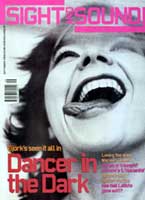Primary navigation

France/Switzerland/UK 1999
Reviewed by Philip Kemp
Our synopses give away the plot in full, including surprise twists.
High in the Nepalese Himalayas, aged chieftan Tinle meets a yak caravan and discovers it leader, his elder son Lhakpa is dead. Karma, who has taken over as leader, explains Lhakpa died when he tried to take a dangerous route. Tinle accuses Karma, who is from a rival clan, of causing his son's death.
When another caravan is due to carry salt over the mountains to trade for grain, Tinle refuses to let Karma lead it. Tinle summons his second son Norbou, a lama, to help him lead it. Karma defiantly sets out with his yaks and the younger tribespeople, refusing to wait for the auspicious day set by the oracles. Four days later Tinle and the older men set out, along with Norbou, Lhakpa's widow Pema and her son Pasang
Determined to overtake Karma, Tinle insists on leading the caravan over a perilous pass. They catch up with Karma who suggests they join forces and rest. Tinle pushes on, leaving Karma behind. Battered by a fierce blizzard, the caravan reaches the highest pass. Tinle, searching for stragglers, falls in the snow; he is rescued by Karma. At the camp Pema is attracted to Karma, while Pasang accepts him as his new father. Norbou persuades Tinle to be reconciled. Tinle names Karma as his successor and dies, celebrated by all.
Sight and Sound plot synopses usually start with an indication of period: "Nepal, the present," or whatever. In the case of Himalaya that would be difficult. From the characters' clothes, artefacts and conversation, the action could be happening any time in the past few centuries. Only a printed label on a bottle, briefly glimpsed, hints that we're in relatively modern times. This sense of timelessness is clearly intended: Eric Valli, a documentarist who has spent years in the region, is aiming in his feature debut for the archetypal quality of myth. In the film's final scene the young lama Norbou, now back in his monastery, recreates the events we've just been watching in the form of a colourful, stylised fresco. When the legend becomes fact, as it were, paint the legend.
The Fordian reference is apposite enough. Valli has spoken of setting out to make "a Tibetan western", and one particular sequence, of excited faces as the yak caravan is about to move off, vividly recalls the corresponding moment in Howard Hawks' Red River (1947). This isn't the only echo of western (in both senses) movies: there are elements of Hawks' film in the plot, and the passage over Demon's Pass looks like a lift from Harry Watt's 'Australian Western' The Overlanders (1946).
These resonances point up the dislocation at the heart of Valli's film. On the one hand there's a strong feeling of authenticity about the physical material: the actors, the buildings, the customs and, of course, the majestic landscape in all its changing moods. Valli's anthropological eye and his long experience of the region serve him well. We may not appreciate fully why certain rituals are carried out as they are here (divination by tossing salt into a fire, for example), but they feel accurately and sensitively portrayed. The performances he's drawn from his largely amateur cast (only one of them, Lhakpa Tsamchoe who plays Pema, has acted before) are also relaxed, in tune with each other and their surroundings.
But for all his film's sense of local actuality, Valli has resorted to an over-determined storyline that bears the hallmarks of a western sensibility. (There's a similar feel to Bruno Coulais' score, with local instruments overlaid with a heavy orchestral wash.) The dynamics of plot and character follow well-worn patterns: generational clash, the stubborn old man versus the young hothead, tradition versus reason, the signalled cruxes (Pasang takes a pendant from his father's corpse and later gives it to his adopted dad Karma), and, above all, the all-too-neat sense of closure when the old man hands over to his young rival before dying. All this seems not so much archetypal as banal, as if Valli was hoping to make the exotic and unknown acceptable by filtering it through familiar narrative devices. If so, he won't be the first documentarist to have used this ploy (Robert Flaherty springs to mind, for one), and with luck the next time round he'll feel confident enough to take a bolder stance. His material more than deserves it.